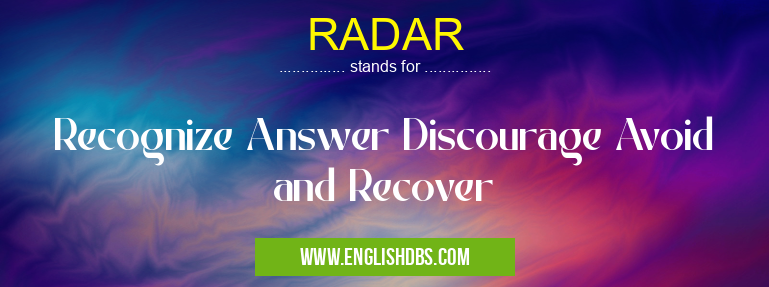What does RADAR mean in UNCLASSIFIED
RADAR is an acronym that stands for Recognize, Answer, Discourage, Avoid, and Recover. It is a communication technique designed to help individuals navigate difficult conversations and maintain healthy relationships. By following the RADAR steps, you can effectively address challenging topics, minimize conflict, and foster understanding.

RADAR meaning in Unclassified in Miscellaneous
RADAR mostly used in an acronym Unclassified in Category Miscellaneous that means Recognize Answer Discourage Avoid and Recover
Shorthand: RADAR,
Full Form: Recognize Answer Discourage Avoid and Recover
For more information of "Recognize Answer Discourage Avoid and Recover", see the section below.
Recognize
- Identify the challenging topic: Determine the specific issue or behavior that is causing difficulty.
- Acknowledge your own feelings: Recognize your emotions and acknowledge how the topic affects you.
- Understand the other person's perspective: Consider the other person's feelings, motivations, and point of view.
Answer
- Respond respectfully: Avoid interrupting or being dismissive. Instead, listen attentively and respond with empathy.
- Use "I" statements: Express your thoughts and feelings using "I" statements to avoid blaming others.
- Focus on facts and specific examples: Support your statements with objective data and specific incidents to avoid generalizations.
Discourage
- Set clear boundaries: Communicate what behaviors are unacceptable and the consequences for crossing those boundaries.
- Enforce boundaries: Consistently follow through on your boundaries to maintain respect and prevent further conflict.
- Avoid engaging in harmful conversations: If the conversation becomes unproductive, disengage and suggest revisiting it later.
Avoid
- Personal attacks: Focus on the issue rather than attacking the other person's character or worth.
- Generalizations: Avoid making sweeping statements or labeling people.
- Sarcasm or condescension: Use respectful and constructive language to maintain a positive tone.
Recover
- Summarize key points: Recap the main points of the conversation to ensure understanding.
- Find common ground: Identify areas where you agree or share similar values.
- Establish next steps: Determine how to resolve the issue or move forward in a positive direction.
Essential Questions and Answers on Recognize Answer Discourage Avoid and Recover in "MISCELLANEOUS»UNFILED"
What is RADAR?
RADAR (Recognize Answer Discourage Avoid and Recover) is a customer service technique used to handle difficult conversations. It involves four steps: Recognizing the customer's emotions, Answering their concerns, Discouraging inappropriate behavior, Avoiding escalation, and Recovering the conversation.
How do I use the RADAR technique?
Recognize: Identify the customer's emotions and acknowledge them. Answer: Address their concerns directly and provide solutions or information. Discourage: Politely but firmly discourage inappropriate behavior, such as rudeness or interruptions. Avoid: Avoid escalating the situation by staying calm and professional. Recover:** Bring the conversation back on track and work towards a resolution.
What are the benefits of using RADAR?
RADAR helps reduce customer frustration, improve customer satisfaction, prevent conflict escalation, and build stronger customer relationships. It also helps customer service representatives maintain their composure and professionalism.
How can I implement RADAR in my customer service approach?
Practice active listening and empathy to recognize emotions. Prepare clear and informative answers to common concerns. Establish boundaries for acceptable behavior. Stay calm and composed in challenging situations. Seek support from a supervisor or colleague if needed.
What are some common pitfalls to avoid when using RADAR?
Avoid interrupting customers, being dismissive or argumentative, taking things personally, or escalating the situation unnecessarily. Instead, focus on understanding the customer's perspective and finding a mutually acceptable solution.
Final Words: By implementing the RADAR technique, you can effectively navigate difficult conversations, minimize conflict, and foster healthier relationships. Remember to approach conversations with empathy, respect, and a willingness to listen and learn. By following the RADAR steps, you can improve communication, build bridges, and create a more harmonious environment.
